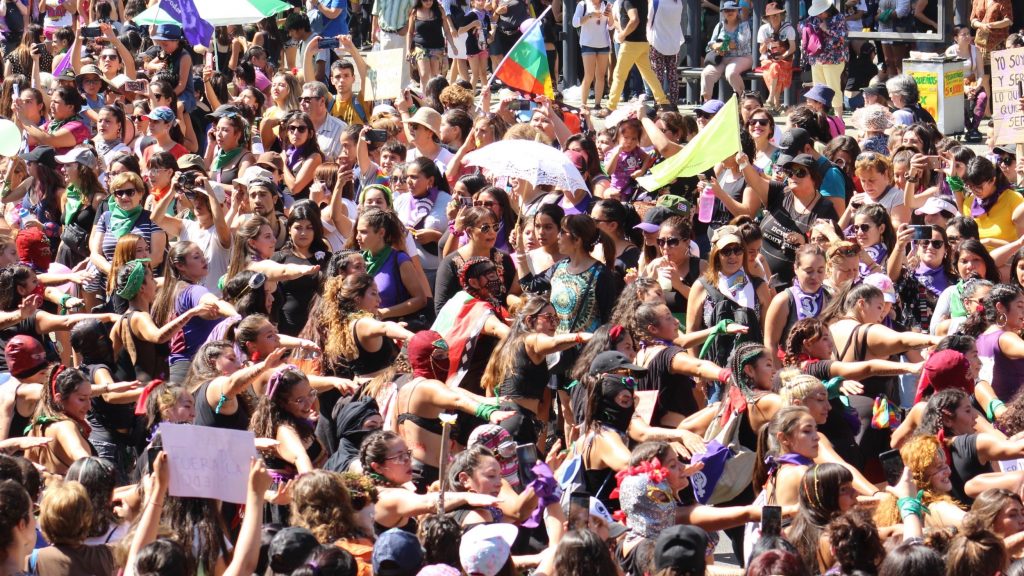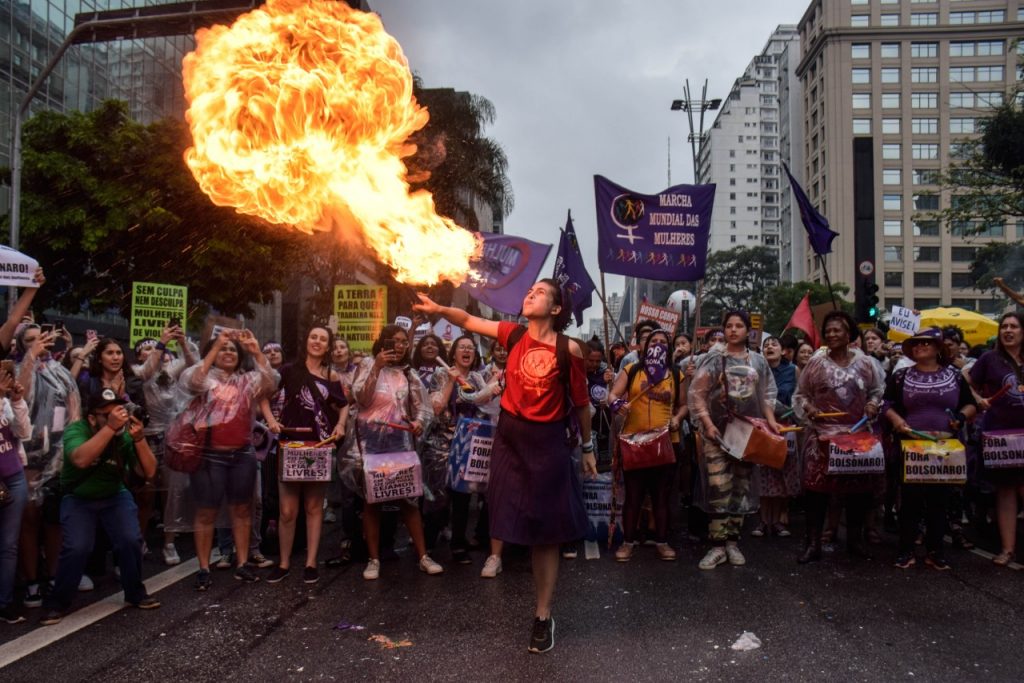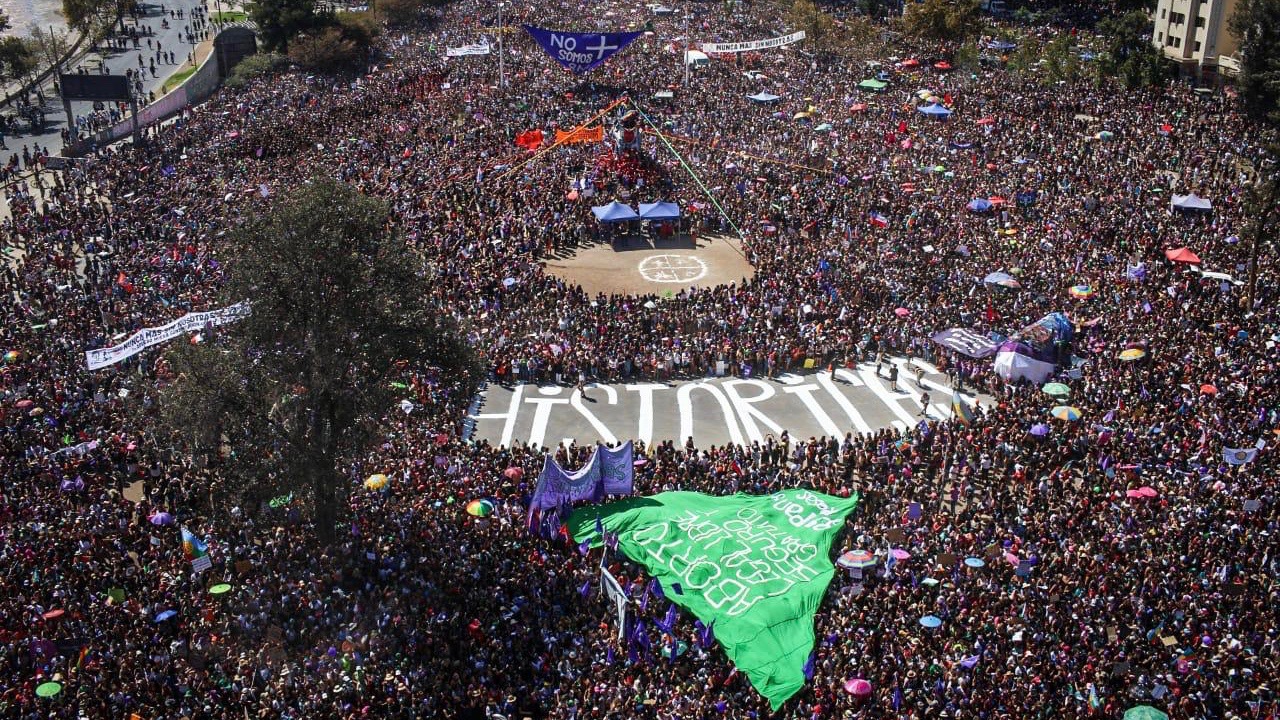This March 8, on the International Working Women’s Day, millions of women across Latin America took to the streets to protest against patriarchy in all its forms and manifestations. From Argentina to Mexico, women demonstrated against the growing gender inequality, gender based violence, femicides, and demanding abortion rights.
In Argentina, the central focus of feminist movements and women’s organizations was the legalization of abortion in the country. The National Campaign for the Right to Legal, Safe and Free, organized a cultural and political day to promote the approval of Voluntary Termination of Pregnancy (IVE) bill and demand the implementation of the Law on Comprehensive Sexual Education (ESI). Under the slogan of “the bill is on the streets,” various cultural, informative and recreational activities were carried out during the day, in preparation for the fight that would begin in the Congress when the head of the state would present the bill.
#8M en #CABA Abajo el patriarcado se va a caer, se va a caer. arriba el feminismo que va a vencer, que va a vencer ????@CampAbortoLegal pic.twitter.com/tvpHBuTzwZ
— Campaña Nacional por el Derecho al Aborto- CABA? (@CampAbortoCABA) March 9, 2020
In the capital, Buenos Aires, thousands of women, feminists, transgender and gender queer people as well as members of left-wing organizations demonstrated with green scarves in hands, the symbol of feminist struggle for legal abortion, in front of the Buenos Aires Cathedral demanding “separation of the Church from the State” and “legalization of abortions” in the country. On March 9, women across Argentina observed a national strike and halted all their activities to demand this integral human right and an end to gender based violence in the country.
In Chile, more than two million women mobilized against patriarchy, violence against women and the current government. In the capital, Santiago, women and members of several feminist and social organizations flooded the iconic Dignity Plaza and the surrounding streets, demonstrating against state repression, neoliberal and patrichal government of Sebastián Piñera. Towards the end of the day, the peaceful mobilization was violently repressed by the officials of national police forces, the Carabineros, with tear gas and toxic water.

In Brazil, hundreds of thousands of women marched across the country demanding equal rights and an end to violence against women. In the capital, Brasilia, 3,500 women from the Landless Rural Workers Movement (MST), mobilized against gender discrimination, gender-based violence and legalization of abortion. In São Paulo, despite heavy rainfall, over thousands gathered at Paulista Avenue and marched through the center of the city, to oppose the far-right and conservative government of Jair Bolsonaro. The demonstration was organized by more than 40 feminist groups, social movements, left-wing parties and trade unions. Under the slogan of “Women against Bolsonaro, for our lives, democracy and rights! Justice for Marielle, Claudia and Dandara”, the march brought together women of all ages, with different stories but the same struggle.

In Colombia, feminist movements mobilized in various parts of the country to reject violence against women, gender inequality and femicides that have become an everyday reality in the country. Hundreds of protesters, wearing purple and green cloths, also demanded an absolute decriminalization of abortions in the country. In the capital Bogotá, dozens gathered outside the women’s prison Buen Pastor to stand in solidarity with the incarcerated women.
#DiaInternacionalDeLaMujer |La Tremenda Revoltosa batucada feminista inició desde las 6 de la mañana a retumbar sus tambores y gritos por las mujeres prisioneras políticas y todas aquellas que se encuentran privadas de la libertad. #NoEstamosTodas pic.twitter.com/ZBwkdZDKBi
— Colombia Informa (@Col_Informa) March 8, 2020
In Mexico, over 80,000 women hit the streets of the capital, Mexico City, demanding an end to all forms of gender-based violence. The violence against women belonging to Indigenous communities has worsened in the country. For this reason, the protesting women organizations also demanded an improved legal framework to address crimes based on gender, ethnicity and economic status, that have often gone unpunished in the country. Young and old women gathered in front of the National Palace and demanded justice for the victims of such violence.

Similar massive demonstrations demanding equal rights, justice for violence suffered, secured future and fundamental right to decide for their bodies, were also held in Ecuador, El Salvador, Guatemala, Honduras and Peru.





